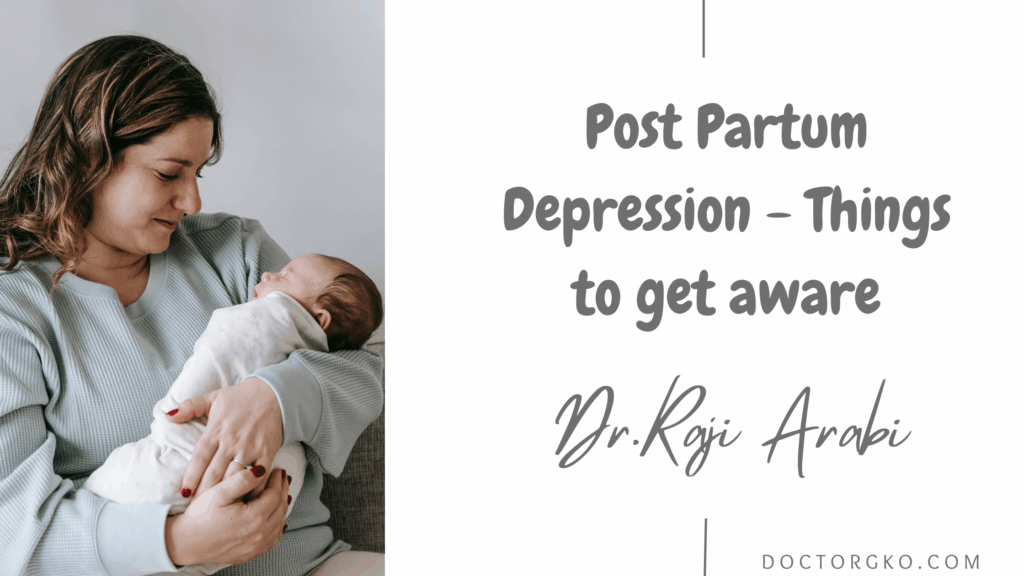Understanding Postpartum Depression: Signs, Symptoms, Baby Blues & Self-Care Management
Becoming a parent is a life-changing experience. The birth of a baby brings a mix of emotions — joy, love, excitement, and sometimes, unexpected sadness or anxiety. While it’s normal to experience mood swings after childbirth, some women go through a more intense and prolonged emotional struggle known as Postpartum Depression (PPD). Understanding the difference between baby blues and PPD, recognizing the signs, and taking steps toward self-care are essential for every new mother.
What Is Postpartum Depression?
Postpartum Depression is a type of mood disorder associated with childbirth. It typically develops within the first few weeks after delivery, but it can start during pregnancy or even up to a year after giving birth. Unlike the baby blues, which usually resolve on their own, PPD is more severe and requires attention and management.
PPD doesn’t reflect weakness or a lack of maternal instinct. It’s a real medical condition that affects about 1 in 7 women and can interfere with a mother’s ability to care for herself and her baby.
Baby Blues vs Postpartum Depression
Baby Blues:
- Affects up to 80% of new mothers.
- Begins within a few days of childbirth.
- Includes mood swings, crying spells, anxiety, irritability.
- Peaks around 4–5 days postpartum and subsides within two weeks.
- Does not require medical treatment.
Postpartum Depression:
- More intense and lasts longer than baby blues.
- Can begin anytime within the first year after delivery.
- Symptoms are severe enough to interfere with daily life.
- Needs professional support and possibly treatment.
Understanding the distinction between these two conditions is crucial for early intervention and recovery.
Signs and Symptoms of Postpartum Depression
PPD presents with a range of emotional, behavioral, and physical symptoms. Some of the key signs and symptoms include:
- Persistent sadness, emptiness, or hopelessness
- Excessive crying without a clear reason
- Feeling overwhelmed or unable to cope
- Loss of interest or pleasure in activities
- Difficulty bonding with your baby
- Withdrawing from family and friends
- Fatigue or lack of energy
- Sleep disturbances (insomnia or sleeping too much)
- Changes in appetite — eating too little or too much
- Feelings of worthlessness, guilt, or inadequacy
- Anxiety or panic attacks
- Thoughts of harming yourself or your baby
If these symptoms persist beyond two weeks or worsen, it’s important to seek professional help.
Risk Factors for PPD
While any new mother can experience postpartum depression, certain risk factors increase vulnerability:
- History of depression or mental health disorders
- Lack of support from family or partner
- Complications during childbirth
- Stressful life events (e.g., financial stress, relationship issues)
- Premature birth or having a baby with special needs
- Hormonal fluctuations post-delivery
Self-Care and Management Tips for Postpartum Depression
Taking care of yourself during and after pregnancy is not selfish — it’s essential. Incorporating practical self-care techniques into your daily life can significantly help in managing postpartum depression or preventing it from worsening. Here are evidence-based self-care practices derived from your helpful poster content:
1.Acknowledge & Accept Your Feelings
Allow yourself to feel without judgment. Recognizing that postpartum depression is a medical condition — not a personal failure — is the first step to healing.
2. Know Your Emotions
Stay mindful of your emotional patterns. Track your moods, identify triggers, and give yourself space to process feelings. Journaling can be a powerful tool.
3.Talk to Your Loved Ones
Open communication with your partner, family, or friends can provide emotional relief and practical support. You don’t have to go through it alone.
4. Prioritize Rest
Sleep deprivation can worsen emotional instability. Rest when your baby sleeps, and accept help with household tasks so you can catch up on much-needed rest.
5. Avoid Guilty Feelings
You are doing your best. Parenting is a learning curve. Let go of the pressure to be perfect. Comparing yourself to others only feeds guilt and insecurity.
6. Connect with Friends
Social connection is crucial. Even a short phone call or video chat with a friend can lift your mood. Reconnect with your support circle.
7. Get Help
Don’t hesitate to ask for help — whether from your spouse, family, or a professional. It’s a strength, not a weakness, to seek support.
8. Find Joyful Activities
Make time for activities you love — music, painting, reading, or simply going for a walk. Engaging in hobbies can reignite a sense of self beyond motherhood.
9. Eat Healthily
Nutrition plays a role in emotional health. Focus on a balanced diet rich in whole grains, lean protein, fresh fruits, and vegetables to stabilize mood.
10. Do Exercise / Walking
Gentle physical activity like walking or postpartum yoga can boost endorphins (feel-good hormones) and reduce stress levels.
11. Expose Yourself to Morning Sunlight
Natural light exposure, especially in the morning, helps regulate sleep patterns and supports vitamin D production — both important for mood regulation.
12. Practice Mindfulness
Mindfulness, meditation, or deep breathing can reduce anxiety and bring calm. Even a few minutes a day can make a difference.
13. Seek Professional Help
If symptoms persist or worsen, consider consulting a qualified Homeopathy Physician. Therapy, support groups, or medication (if prescribed) can support your healing journey.
When to Seek Emergency Help
If you experience:
- Thoughts of harming yourself or your baby
- Delusions or hallucinations
- Extreme agitation or confusion
These could be signs of postpartum psychosis, a rare but serious condition that requires immediate medical attention. Homeopathy offers the best solution for Postpartum Psychosis.
Final Thoughts
Postpartum depression is not something to be ashamed of. It is not a Character flaw or the signs of weakness. It’s a common, treatable condition that affects many mothers. The key is to recognize the symptoms early, practice consistent self-care, and reach out for professional support when needed.
Your well-being matters — not just for you, but for your baby and your family. Healing from PPD is possible, and with the right support, you can reclaim joy, confidence, and connection in your parenting journey.
SEO Keywords Used:
- Postpartum depression
- Baby blues
- Signs and symptoms of postpartum depression
- Postpartum depression self-care
- Managing postpartum depression
- Emotional health after childbirth
- Mental health for new moms
Healthy Habits that will change your life
Positive thinking- How to stay positive
Emotion regulation strategies
Amygdala Hijacking and Selfcare
Share this post: on Twitter on Facebook on LinkedIn





